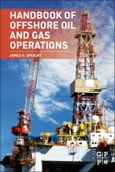Handbook of Offshore Oil and Gas Operations is an authoritative source providing extensive up-to-date coverage of the technology used in the exploration, drilling, production, and operations in an offshore setting. Offshore oil and gas activity is growing at an expansive rate and this must-have training guide covers the full spectrum including geology, types of platforms, exploration methods, production and enhanced recovery methods, pipelines, and envinronmental managment and impact, specifically worldwide advances in study, control, and prevention of the industry's impact on the marine environment and its living resources. In addition, this book provides a go-to glossary for quick reference. Handbook of Offshore Oil and Gas Operations empowers oil and gas engineers and managers to understand and capture on one of the fastest growing markets in the energy sector today.
Please Note: This is an On Demand product, delivery may take up to 11 working days after payment has been received.
Table of Contents
1. Occurrence and Formation of Crude Oil and Natural Gas2. Offshore Geology and Operations
3. Offshore Platforms
4. Exploration
5. Drilling and Well Completion
6. Production
7. Transportation
8. Corrosion
9. Environmental Impact
10. Legislation and The Future
Glossary
Index
Authors
James G. Speight Editor, Petroleum Science and Technology (formerly Fuel Science and Technology International) and Energy Sources and Adjunct Professor, Chemical and Fuels Engineering, University of Utah, USA.James G. Speight is a senior fuel consultant as well as an Adjunct Professor of Chemical and Fuels Engineering at the University of Utah, USA. He is recognized internationally as an expert in the characterization, properties, and processing of conventional and synthetic fuels and as a chemist with more than 35 years of experience in thermal/process chemistry, thermodynamics, refining of petroleum, heavy oil, and tar sand bitumen, and physics of crude with emphasis on distillation, visbreaking, coking units, and oil-rock or oil catalyst interactions. Speight is currently Editor-in-Chief for the Journal of Petroleum Science and Technology, Energy Sources-Part A: Recovery, Utilization, and Environmental Effects, and Energy Sources-Part B: Economics, Planning, and Policy. He is also the author/editor/compiler of more than 25 books and bibliographies related to fossil fuel processing and environmental issues.
Speight was Chief Scientific Officer and then Chief Executive Officer of the Western Research Institute, Laramie, WY, USA, from 1984 to 2000. During this period he led a staff of more that 150 scientists, engineers, and technicians in developing new technology for gas processing, petroleum, shale oil, tar sand bitumen, and asphalt. Speight has considerable expertise in evaluating new technologies for patentability and commercial application. As a result of his work, he was awarded the Diploma of Honor, National Petroleum Engineering Society, for outstanding contributions to the petroleum industry in 1995 and the Gold Medal of Russian Academy of Sciences (Natural) for outstanding work in the area of petroleum science in 1996. He has also received the Specialist Invitation Program Speakers Award from NEDO (New Energy Development Organization, Government of Japan) in 1987 and again in 1996 for his contributions to coal research. In 2001, he was also awarded the Einstein Medal of the Russian Academy of Sciences (Natural) in recognition of outstanding contributions.








